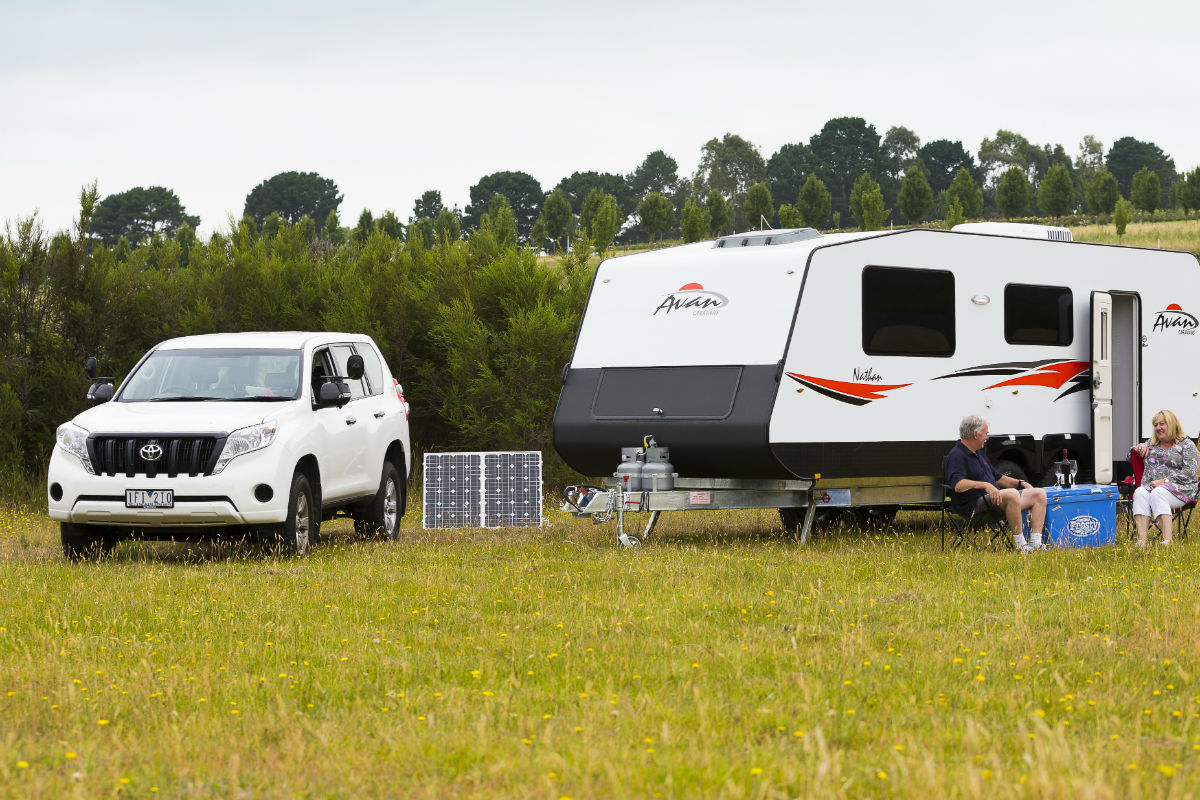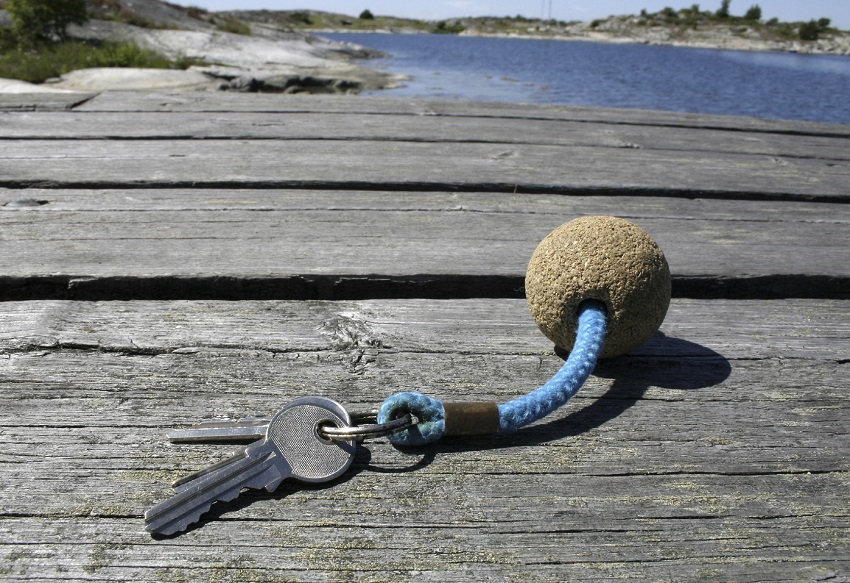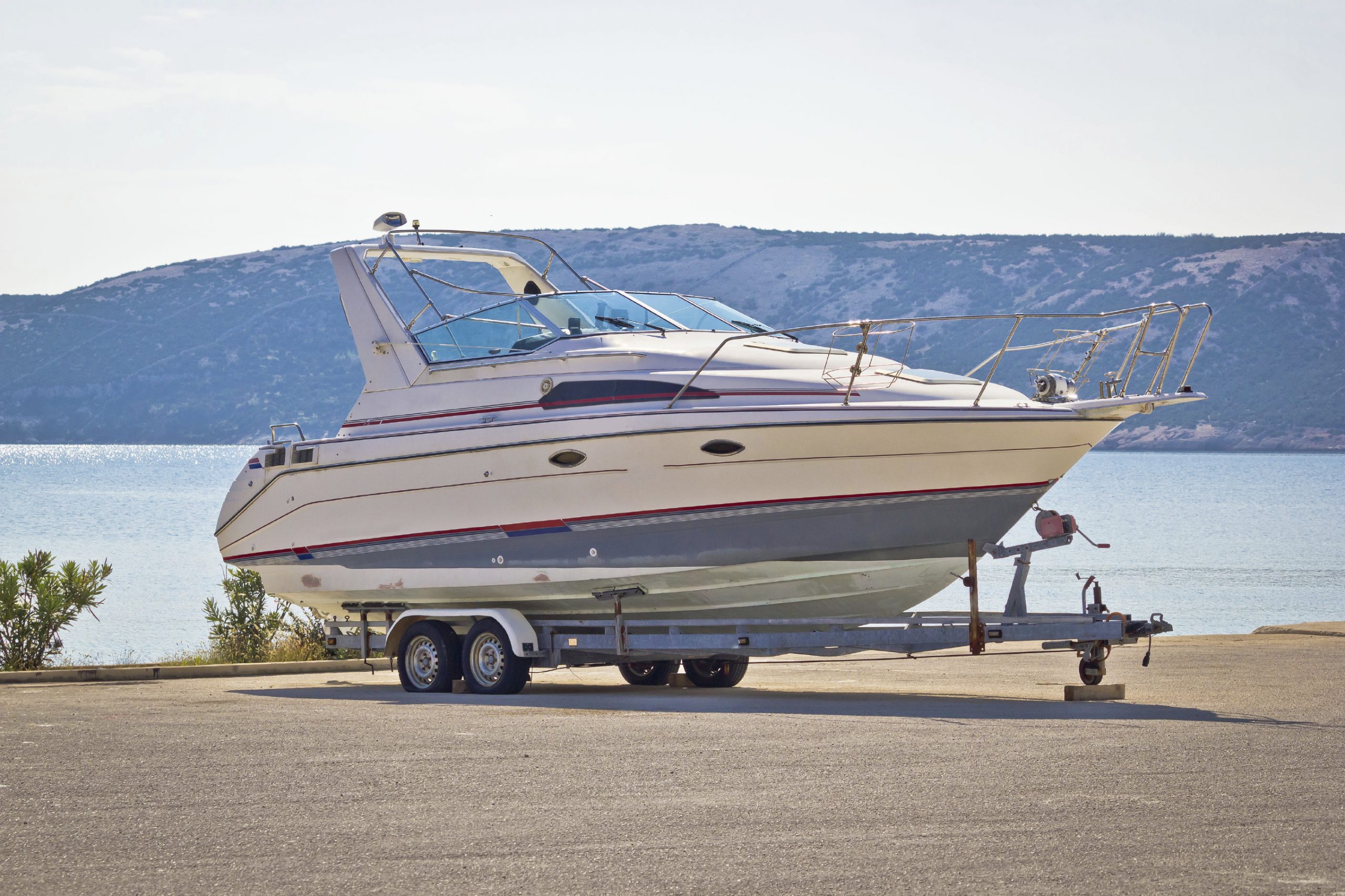It’s the power-laden question, which continues to generate debate around the campfire: which is a better portable power alternative – solar or generator?
We called for some professional backup to delve into this technical quandary, and discovered that, unfortunately – or fortunately, depending on your view – there’s really no definitive answer. Indeed, both systems have their merits and shortcomings, and both can truly enhance your caravanning experience.
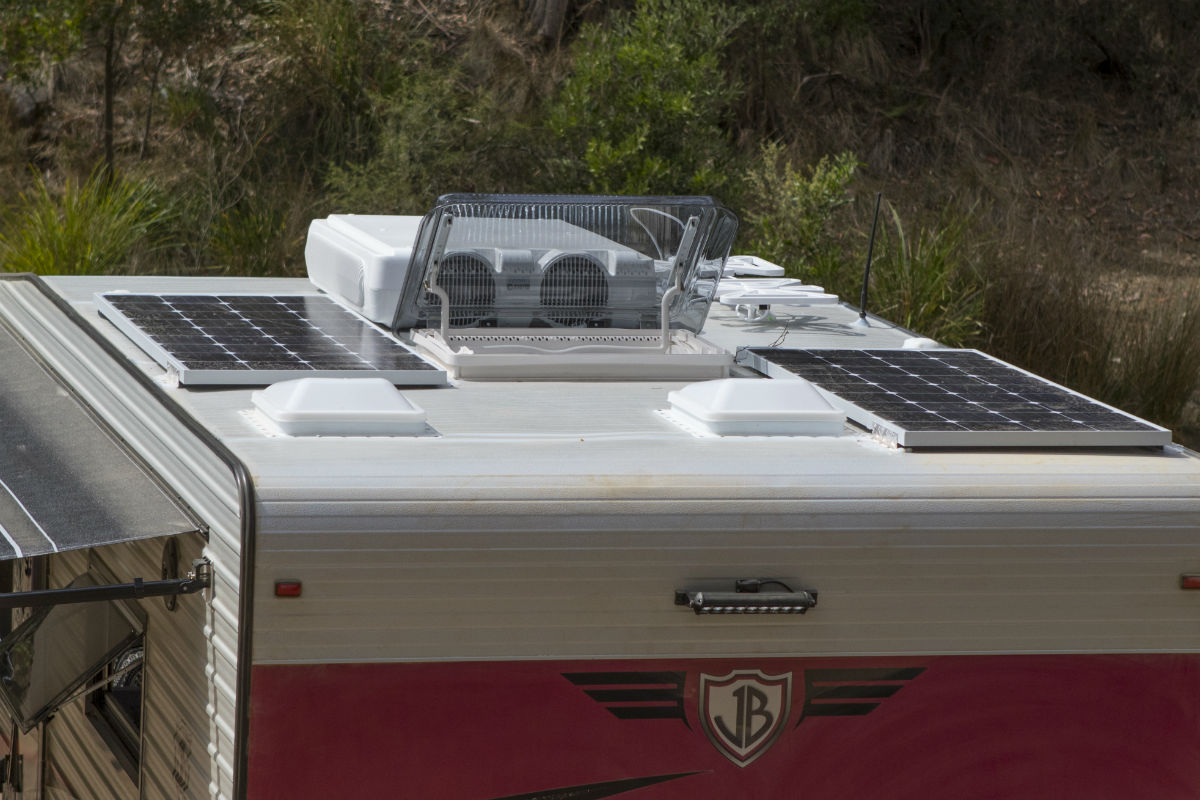
Traditionally, Australian vanners have used generators for backup power, or they simply start up their car and charge their van’s batteries from the alternators for energy when they are off the grid. Both these methods, however, are noisy, produce fumes and are not environmentally friendly. Solar, on the other hand, creates no noise, no fumes, and it is environmentally sustainable.
However, it’s pretty unlikely that a solar system could entirely power a modern RV, and a lot depends on its build and the way you use it. In many cases, solar can’t completely replace a generator or alternator because you can only fit a limited amount of solar panels on a caravan’s roof, and the power is not always enough to power everything you need indefinitely. For example, if a modern caravan, fitted with a large range of hungry electrical appliances such as a washing machine, toaster, fridge and air-conditioner, is parked in the bush (off the grid) and the tow vehicle’s engine is not being used to charge the battery, it is highly improbable that solar could power everything indefinitely, so you may need a generator for backup power. But if an RV spends a couple of hours driving, allowing the alternator to charge the battery and the power-hungry air-conditioner isn’t used, it’s possible you would be fine with a 1kW solar system and would never need a generator again.
With a decent solar system, most campers could get away with not using a generator, or just carrying it as a backup in case of bad weather. For the others, solar will reduce the run time of a generator significantly.
So that begs the question, if you can’t power everything by solar, should you bother using solar at all?
COST, EMISSIONS, RESTRICTIONS
Cost-wise, both generators and solar have an upfront equipment cost which depends largely on their size. Generators consume fuel, adding a continuous running cost but solar costs basically nothing to run.
Generators need to be serviced regularly, whereas a well-designed solar system should work autonomously. The solar regulator will take care of the battery, and a deep-cycle battery is fully sealed and maintenance free.
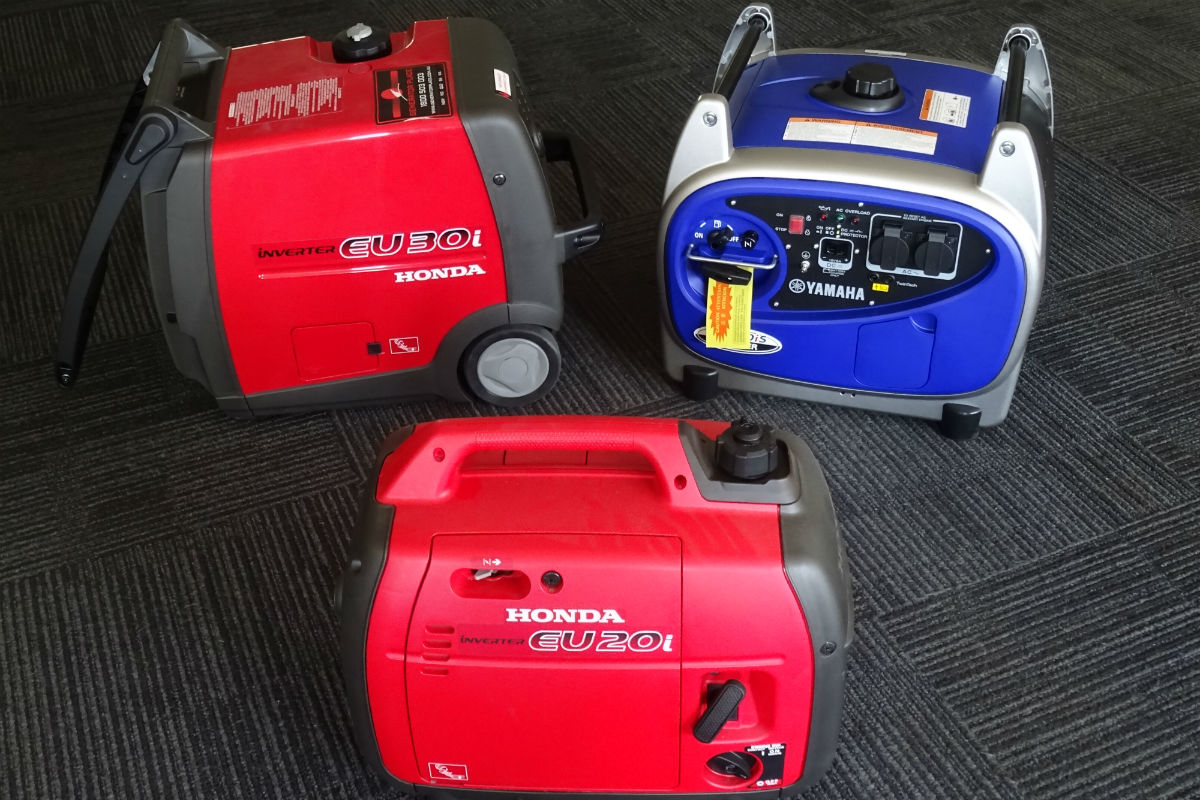
Solar expert Roy Ding of Arizon Clean Energy Solutions in Victoria said, compared to a generator, solar has many advantages.
“During operation, it’s completely noiseless; the energy is collected from solar irradiation so it is environmentally sustainable; it doesn’t emit any smelly gas; and, most importantly, it is free to run,” Ding said.
It’s also worth taking into account that generators can’t be used in most national parks, and use may need to be limited to respectful levels in free camps where other travellers are trying to enjoy the serenity.
CAPABILITY
But if there are appliances with high energy consumption running in the caravan all the time, such as electric heating or air-conditioning, solar can turn out to be a waste of money.
An average-sized van should be able to host between 200-300W of solar, Ding said, which would produce enough energy for light power needs such as 12V lighting, water pump, 12V TV and an energy-efficient 12V fridge of around 50L in size.
“We have seen a major shift from generator to solar energy in the last couple of years and many Australian campers have been camping completely off-grid with solar,” Ding said.
“But, in some cases, solar energy is not enough. The amount of energy produced by a solar system is restricted by the size of solar panels that we can fit onto the available space on the roof. We can easily find a 2kW inverter, but we will be considered to be lucky if we manage to fit more than 500W of solar panels on an average-sized van. So if you have more demanding energy requirements, it will be inevitable to use a generator and run these appliances directly off an inverter.”
Solar energy is, in some ways, not as reliable as generators, if you don’t take the mechanical failure of a generator into account.
“Generators are able to provide their rated power continuously, however, the power produced by solar panels is heavily dependent on the weather and where the van is parked,” Ding said. “On a rainy day, expect your solar system output to drop to about 20 per cent of its rated output. If you decide to park the van under the shade the output will be even less than that.
“A well-managed solar system is more than enough to power most standard 12V usage and you only need to turn on your generator to power the 240V appliances, which generally you would run for no more than 10 minutes anyway.”
Redarc Electronics’ marketing manager Tennille Reed said that, when using solar to free camp, the most important factor is to know what your daily power consumption will be.
“The last thing you want is to run out of power early on in your travels and, if you’re not careful, you could find yourself stranded out in the middle of nowhere. So, do your homework first to know exactly how much power each load consumes so that you can achieve the best results for solar charging and getting the right battery bank size.”
She said a significant drawback when using solar is that the efficiency of your panels is reliant on weather.
“A generator, on the other hand, is impervious to turbulent weather conditions. That’s the one thing going for generators – reliability. It’s not really dependent on anything other than you remembering to fuel up to keep it going.”
HOW TO USE SOLAR
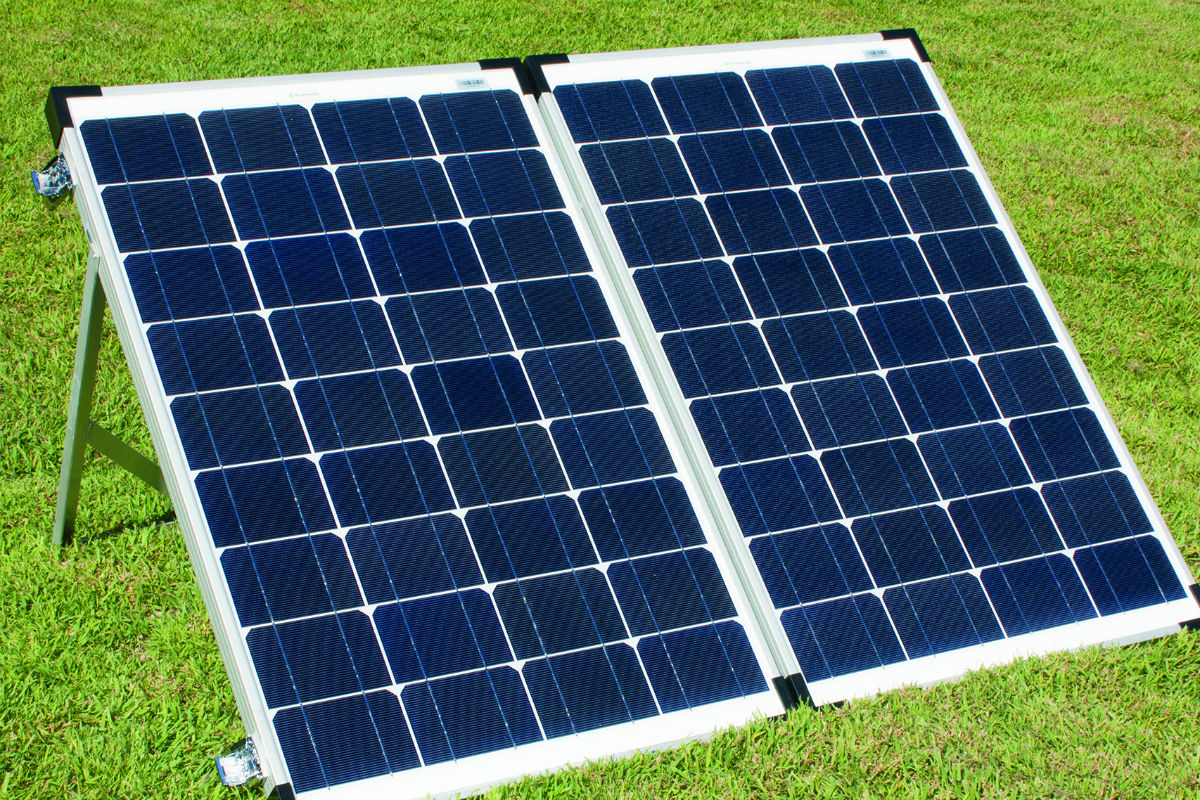
For most people, solar should be thought of as one part of a van’s power supply system, so the question becomes how solar fits into your overall energy management system.
The central element of any energy system is the battery and all other energy management equipment, such as inverters and battery chargers, should work closely with the battery. Thus, a solar system is an energy source used as an alternative to traditional energy sources such as alternators and generators.
Because it is an alternative, almost every caravan will have a battery/battery charger installed, but there are many out there that don’t have a solar system and just charge the battery off a generator when they are off-grid.
So does this mean that, if I’m going to need a generator anyway, I shouldn’t bother with a solar system at all?
“Not at all,” Ding said. “A solar system that keeps topping up your battery will significantly reduce your generator’s run time, saving you and your campsite neighbours from the noises and fumes.”
Reed said combining free solar power with a vehicle charging system makes a virtually self-sufficient auxiliary battery power system possible.
“No matter what the requirements are of your electrical system, solar is a great way to supplement your battery charging when camping,” she said. “This does not discount the value of charging batteries to 100 per cent whilst driving to your destination.”
But solar struggles with high energy consumption appliances that run continuously. And that’s why solar can’t completely replace a generator or alternator.
Things you probably should not attempt to run on solar include an oven, toaster, stove, microwave, hair dryer, air-conditioner and washing machine, and any items with a heating element that use very high amounts of power. That’s the domain of a conventional generator or an inverter generator.
Conventional generators are usually diesel or petrol-fuelled, and power a motor attached to an alternator that produces electricity. Inverter generators possess advanced electronic circuitry, and output AC current which is converted to DC and then inverted back to clean AC power which is perfect for sensitive electronic equipment like laptops and TVs.
To put it simply, inverter generators reign supreme in the categories of size/weight/portability; noise; fuel efficiency; quality of power output; and parallel operation. Whereas conventional generators take the honours in areas of maximum power output and price. And both fare pretty equally in terms of run times.
IDEAL SETUP
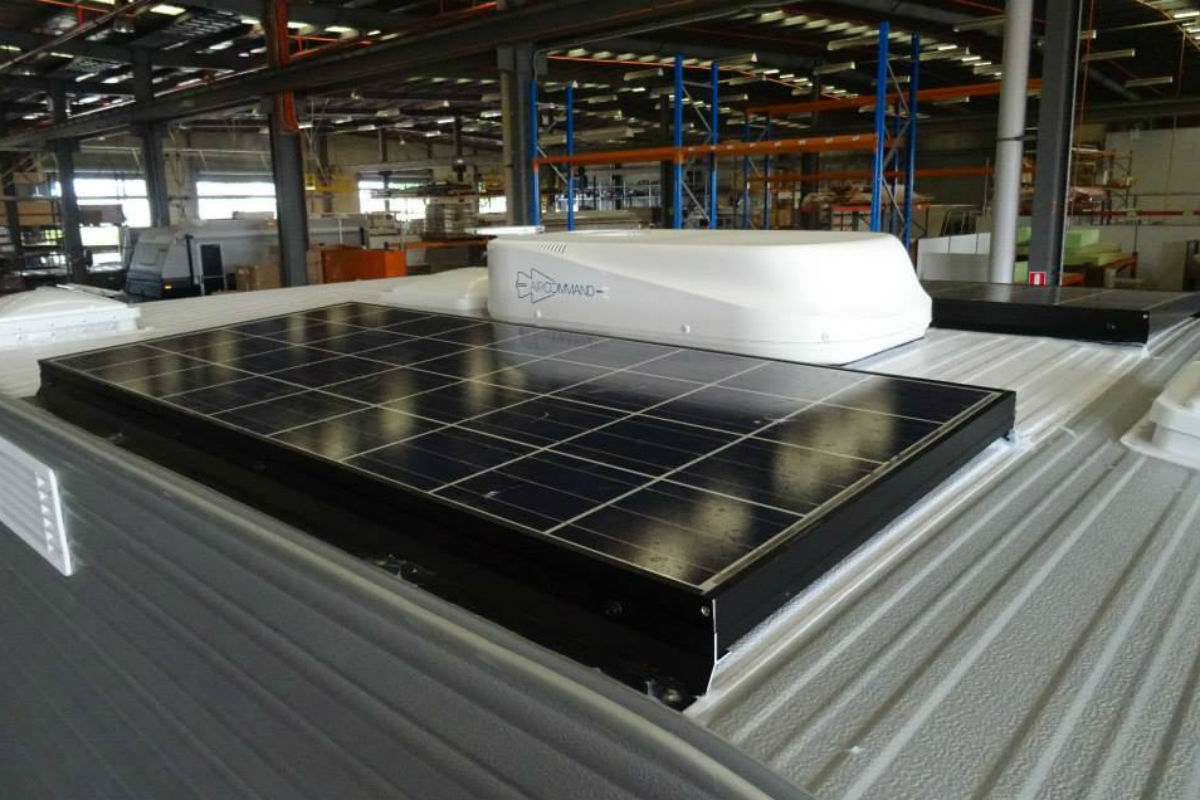
“It’s definitely the case to look at how and where you are considering travelling, in what time of the year, and how much power you will likely use,” Glen Gall, director of Queensland-based offroad manufacturer Kedron Caravans, said. “If you are going very remote, and have a heavy reliance on power for fridges, lighting, TVs, water pumps etc., then a perfect scenario is to have three 150W solar panels, a 300Ah lithium power pack and a backup generator in case of extended cloudy weather.”
He said this was an almost fail-safe way to ensure constant power. But if you’re looking to do a combination of caravan park and national park stays, two solar panels, two batteries and a 2kVa generator as a backup would be suitable.
“If a focus can be on having solar do as much as possible for the power needs, and have, say, a diesel heater for warming the van in cold areas to limit the need to draw 240V for the reverse cycle air-conditioner when off the grid, and have a generator as a backup to run chargers and air-conditioners when in extreme heat, this can definitely prove to be the most reliable, and peaceful travel for you, and others around you!”
Reed said a reliable power supply was important when using the broad range of electrical appliances that are a part of modern caravanning lifestyle, as they make life more comfortable and safe on the road.
“Having a mix of fixed and portable panels is the optimum solution as you can set up your caravan/trailer under a shady tree and then use blankets/portable panels to lay out in the sun – without needing to park your caravan/trailer out in the glaring hot sun,” she said.
WHAT ABOUT LITHIUM?
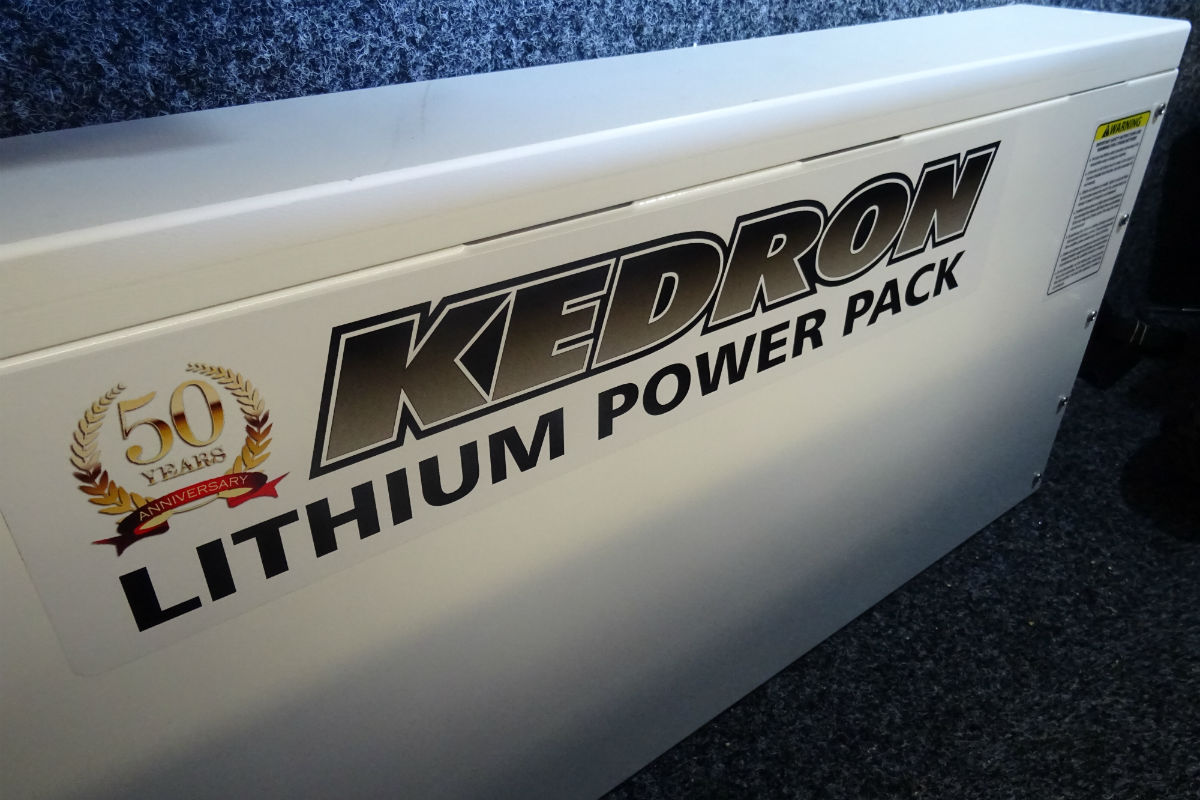
Gall said the way you generate and store power is an issue of utmost importance to all vanners, particularly remote travellers.
“With this in mind, it’s very important to take into consideration both how the van’s appliances and inclusions will draw upon this, and then where you plan on travelling,” Gall said.
“When heading north into a hotter climate, even with plenty of sunshine to recharge, a generator is still one of the first options opted for by most buyers, generally to run an air-conditioner in the heat.
“And as the power systems have diversified lately into lithium power packs, large inverters can also be installed to run air-conditioners.
“One positive here is that it can allow a smaller 1kVA generator to be used to run a 240V charger to top up, while the lithium is running the inverter for the output.”
To explain, common lead acid batteries can’t run a heavy load, such as air-conditioners, for two reasons. Firstly, under heavy load, the voltage of a lead acid battery will drop significantly. The battery protection device will cut the air-con off soon after it’s started because it detects voltage on the battery terminal that is lower than the low cut-off voltage. Secondly, the total capacity of a lead acid battery is related to the number of amps we draw; the larger the amps we draw from the battery, the less total available capacity it will have.
Lithium batteries are totally different. Their voltage will not change much under heavy load, and their total capacity will not fluctuate much under different loads. These two factors make them ideal for powering heavy appliances such as air-conditioners. But it is almost impossible to replenish the energy that is used by air-con with solar alone.
So you may need to run the generator, plug a powerful battery charger to the generator and charge the lithium batteries from that. Because the air-con is running off the inverter, which is powered by the battery, some of the charger’s output will be used to directly power the inverter and the extra amps will go into the battery.
THE MILLION DOLLAR QUESTION
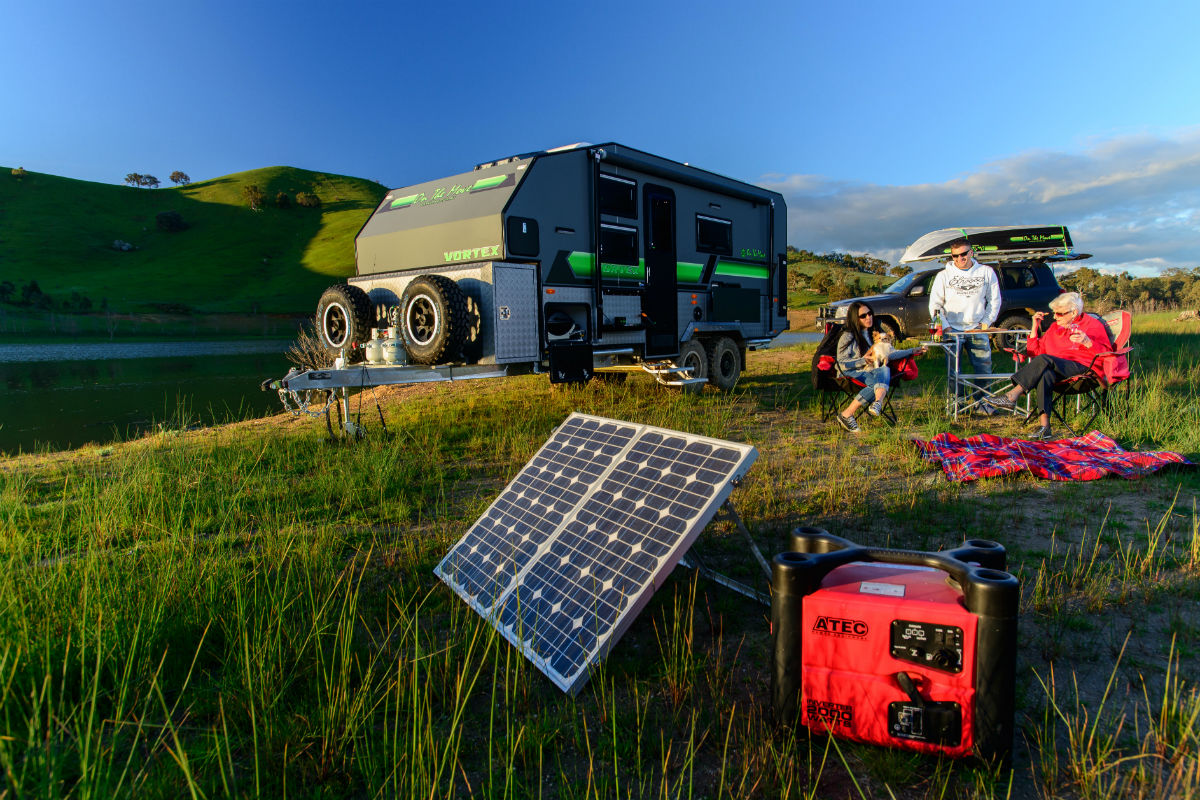
Solar or generator? The most obvious deduction is that it really comes down to your needs. The decision should be based on the prevailing climate, location, time of year, and the amount of power you require.
In summary, solar power makes no noise when generating power and it requires no moving parts, hence minimal maintenance. On the contrary, generators (particularly conventional models) can be loud, require upkeep, and are prohibited in national parks and even some caravan parks.
However, generators provide instant and reliable power, and when combined with a 240V charger, will run all appliances at the same time as they recharge the battery bank. Conversely, solar power relies heavily on the sun to function efficiently and is predominantly limited to running low-current appliances.
The perennial discussion will, no doubt, continue to power on!

